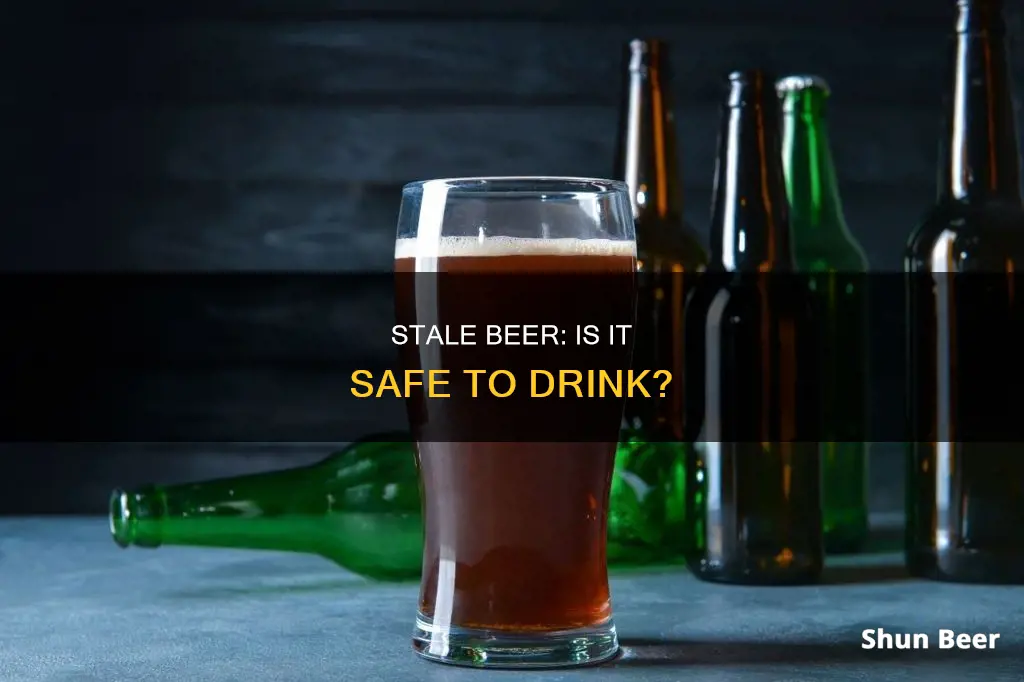
Beer does have a shelf life, and it's generally recommended to buy and drink beer as close to the packaging date as possible. However, drinking expired beer is harmless. It is non-toxic and safe to drink, but it might not taste very nice and is likely to smell odd and taste stale or flat. The expiry date on beer is a guide to whether the beer will have a good flavour, but it's not a hard-and-fast rule. The longevity of beer depends on factors such as the way it's been stored, the storage temperature, and the type of beer.
| Characteristics | Values |
|---|---|
| Drinking stale beer | Harmless, non-toxic, and safe to drink |
| Beer shelf life | 5-9 months beyond the expiration date listed on the label at room temperature; 2-3 years in a refrigerator |
| Beer taste | Unpleasant, stale, flat, or sweet |
| Beer aroma | Odd |
| Beer packaging | Unpunctured or undamaged |
| Beer storage | Dark, cool place, away from direct sunlight, and upright |
What You'll Learn

Drinking stale beer is harmless
The Washington Post notes that the decrease in taste usually comes down to three factors: hops, light, and oxygen. Beer is similar to wine in that it ages even after bottling. Unlike wine, however, after a certain amount of time passes, the taste gets worse rather than better. So, it's always best to buy and drink beer as close to the packaging date as possible.
To prolong the shelf life of your beer, it is recommended to store it in a dark place, out of direct sunlight, and at the right temperature. Standard beers, such as IPAs or stouts, are usually stored at 50 to 54°F (10 to 12°C), while lighter beers such as pilsners and lagers should be stored a bit cooler.
It is also worth investing in cans instead of bottles as they are likely to last longer. Unlike bottled beer, canned beer is airtight, and therefore, not as susceptible to oxidation, which kills the flavour of beer.
So, if you have a can or bottle of beer that is past its "best before" date, it is probably still safe to drink. Just be aware that it might not taste as good as it once did!
Drinking Beer on a Boat in Pennsylvania: What's Legal?
You may want to see also

It won't taste good
Drinking stale beer may not be the best idea if you are looking for a refreshing drink with a great taste. While stale or expired beer is typically safe to consume and won't make you sick, it often tastes unpleasant and may have an odd smell. The beer's flavour compounds break down over time, causing a loss of the desired sharp and bright flavours. Instead, you might experience stale, flat, or even sweeter flavours, similar to sherry.
The hop aromas in beer are very time-sensitive, and the desired citrusy, floral, or tropical notes will disintegrate over time. Additionally, if your beer has been exposed to oxygen, it may develop a stale "cardboard" flavour due to oxidation. This process can be accelerated by temperature fluctuations, so it is best to keep your beers cool and stored in a dark place.
The type of packaging can also make a difference. Glass bottles are typically not 100% airtight, allowing oxygen to interact with the beer and causing a flat taste. In contrast, cans are airtight and better preserve the freshness of the beer.
The bottom line is that stale beer won't harm your health, but it won't taste as good as fresh beer. If you're a beer connoisseur or simply enjoy a delicious brew, it's best to stick to fresh, properly stored beer to savour the flavours and aromas the brewers intended.
Miller Beer Text Rebates: How Do They Work?
You may want to see also

It's probably safe to drink
Drinking stale beer is probably safe. Beer usually has a "best before" date, which is more of a guideline on quality than safety. This means that the beer will start to lose its quality after the stated date, but it is still safe to consume. The flavour and quality of the beer will degrade over time, and it may taste stale or flat, but it won't make you sick.
The fermentation process is an effective way of eliminating pathogens from your drink, and the beer is also usually filtered or pasteurised before bottling or canning, which eliminates bacteria. As long as the packaging is intact and undamaged, the beer will be safe to drink.
The longevity of beer depends on factors such as the way it is packaged and stored, and the storage temperature. Beer stored in a refrigerator will last longer than beer stored at room temperature. Beer in glass bottles, for example, will have some air at the top and will not be 100% airtight, allowing oxygen inside to interact with the beer and affect its flavour. On the other hand, cans are airtight and better protect the beer from oxidation.
Additionally, light exposure can affect the flavour of beer. Beer stored in clear glass bottles may not last as long as beer bottled in dark glass or cans, as the chemicals in hops react poorly to ultraviolet light, resulting in a skunky odour and taste. Therefore, to prolong the shelf life of your beer, it is recommended to store it in a dark, cool place, away from direct sunlight, and to store it upright to minimise oxidation.
Beer and Bulking: Friend or Foe?
You may want to see also

It might smell odd
Stale beer is likely to have an unusual smell. This is due to the oxidation of the beer, which occurs when oxygen interacts with the compounds that give the beer its flavour and aroma. Some of these compounds will break down and disappear, while others will change form and create a stronger taste. This can result in a stale or flat taste, or a sweeter, more syrupy flavour. The oxidation process is accelerated by heat, so beer kept at room temperature or above will go stale more quickly than refrigerated beer.
The speed of oxidation is also influenced by the type of packaging. Glass bottles are not 100% airtight, so oxygen can get inside and affect the beer. Cans, on the other hand, are airtight and therefore better at preserving the freshness of the beer.
In addition to oxidation, light exposure can also cause beer to develop a skunky odour and taste. This is because the chemicals in hops react poorly with ultraviolet light. Beer packaged in clear or green bottles is more susceptible to this, whereas brown bottles offer better protection, and cans shield the beer from light entirely.
The flavour of beer is also influenced by the amount of alcohol it contains. Neat alcohol will retain its flavour almost indefinitely, and stronger beers such as porters or imperial stouts can stay tasting good for between 5 and 10 years. Standard strength beers, including pale ales, IPAs and lagers, will usually stay fresh for between 6 months and 2 years.
Heart Stents and Beer: Is It Safe?
You may want to see also

It's best to store beer in a cool, dark place
Beer certainly has a shelf life, and it's harmless to drink expired beer, but it's likely to be stale and flat. To keep your beer tasting fresh, it's best to store it in a cool, dark place.
Beer is best stored at a steady temperature of 50 to 55°F (10 to 12°C). This is known as "cellar temperature," and a good beer fridge will keep the temperature within this range. Keeping beer chilled slows down the aging process and helps to prevent flavour loss. Beer stored at room temperature will spoil faster.
UV rays from sunlight can cause a chemical reaction in beer, breaking down its flavour components and causing it to smell and taste like skunk spray. Beer stored in direct sunlight is said to have been "skunked" or "lightstruck". So, it's best to keep beer out of direct sunlight and protect it from damaging UV rays.
Overexposure to oxygen can also alter the taste of beer. Bottled beer is at a higher risk of oxygen exposure than canned beer, and storing beer upright minimises the beer's surface area in contact with the air.
Keeping beer in a cool, dark place helps to ensure its quality remains high and prevents common issues such as knowing when a beer has spoiled and how to extend its shelf life.
Beer and Lifting Weights: A Healthy Balance?
You may want to see also
Frequently asked questions
Drinking stale beer is unlikely to harm your health. The beer will have been treated by being filtered or pasteurized before bottling or canning, eliminating any harmful bacteria. However, if the packaging has been compromised, for example, a dented or punctured can, then it may not be safe to drink.
Stale beer will likely have an unpleasant taste and smell odd. It may taste flat, or have a sweeter, more syrupy flavour. It may also have a stale flavour described as "cardboard".
Beer is best consumed as close to the packaging date as possible, as this is when it is freshest. Beer has a shelf life of around 4-6 months after brewing, or 6-9 months after the 'best before' date. However, this depends on the type of beer, the alcohol content, and how it is stored. Stronger beers, like porters or imperial stouts, can stay tasting good for between 5 and 10 years.







